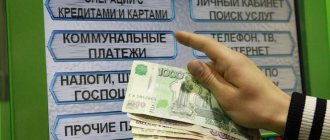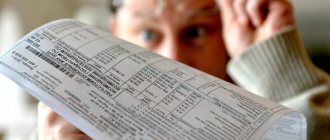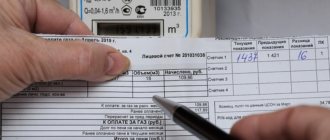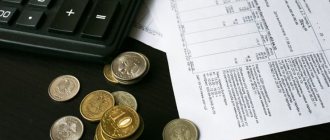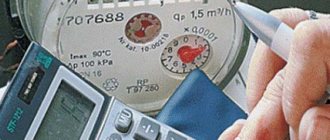Home » Legal assistance » Utility payments for an apartment in which no one is registered or lives
The Russian government is actively pursuing reforms in the housing and communal services sector, amending existing laws. However, some of these changes, unfortunately, did not make life easier for citizens, but, on the contrary, made it more difficult.
One of the most controversial issues is the issue of paying utility bills for apartments in which no one is registered. Today there are many such apartments, and lawyers are often faced with the problem of calculating rent in such cases.
Unfortunately, there is no clear and precise procedure for calculating rent for an apartment in which residents are not registered. Because of this, payers have misunderstandings.
The legislative framework
All issues related to payment for housing and utility bills are regulated by two codes - the Civil and Housing Code of the Russian Federation. The Civil Code defines cases in which the right to own an apartment arises and the moment at which a citizen must begin paying rent. The Housing Code regulates the legal obligations of the apartment owner, as well as the system for calculating utility bills and their amount.
According to Article 153 of the Housing Code, owners of residential premises are obliged to pay for their maintenance and utilities on time and in full.
In the Housing Code you can find the following:
- What charges are legal (Article 154)
- What payment rules are established by law (Article 155)
- What amount of payment and form is acceptable (Articles 156 - 157)
- What expenses are the owners of real estate in apartment buildings required to bear (Article 158)
- Who can count on what benefits and subsidies when paying for housing and communal services (Articles 159-160)
Questions related to the payment of utility bills in the absence of registered ones in the apartment most often arise among new owners of residential premises, after:
- Equity participation in the construction of new housing and before registration of its ownership
- Purchasing or obtaining additional living space in which no one lives
- Moving from old housing and canceling registration in it
The grounds after which the obligation to maintain real estate passes to the new owner are also described in Article 153:
- The owner is burdened with these obligations from the date of registration of the right indicated in the certificate of ownership of real estate (Civil Code of the Russian Federation, Art. 219)
- Tenants, from the moment of execution of the rental agreement (Civil Code of the Russian Federation, Chapter 34)
- Tenants, from the moment of execution of the lease agreement (Civil Code of the Russian Federation, Chapter 35)
- Owners of premises received from developers - after execution of the transfer and acceptance certificate (Civil Code of the Russian Federation, Art. 556)
- Participants in residential cooperatives from the date of provision of the property (RF Housing Code Art. 124)
Important! From the moment the owner of a residential premises moves into it or becomes the owner by law, he is obliged to bear the costs of maintaining the living space, regardless of whether anyone is registered there or not, whether the premises are residential or temporarily empty.
If the premises are located in an apartment building, the owner is required to pay for the maintenance and repair of common property in the part determined by his share.
Registration of a housing subsidy in the absence of registered tenants
To save on utility bills, many residents are trying to take advantage of government programs to support low-income citizens. The question of whether it is possible to apply for a subsidy if no one is registered in the apartment is becoming increasingly relevant due to the increase in tariffs, changes in the rules for charging receipts and calculating penalties.
The grounds and procedure for calculating state aid are determined by Art. 159 of the Housing Code of the Russian Federation, as well as the provision of subsidies developed on its basis for the payment of residential premises and utilities (approved by Decree of the Government of the Russian Federation No. 761 of December 14, 2005).
In 2021, assistance can be received by families whose utility bills exceed 22% of the total income of all household members (this figure varies depending on the region), as well as persons in preferential categories - pensioners, large families and the like. You must be a citizen of the Russian Federation and not have debts for utilities as of the current date.
Regarding the right to apply for a subsidy for housing where no one is registered, the Code and Rules contain two points:
- clause 2 art. 159 of the Housing Code, which states that “owners of residential premises” are among the persons entitled to state assistance. It doesn’t matter whether the citizen is the owner of the privatized apartment or whether he inherited it;
- Clause 8 of the Rules, which provides a list of papers for obtaining benefits. It states here that the applicant must provide title documents for the housing “in which he is registered at his place of permanent residence.” That is, you must be registered in the apartment.
Thus, it is problematic to obtain a subsidy for zero.
The situation with the owner
Payments for utilities and rent for private property begin to be calculated from the moment a citizen registers ownership rights to it.
It is worth noting the fact that, in accordance with current legislation, even in the case of the temporary absence of the owner in the specified premises, it is not possible to recalculate payment for such services as:
- Current repairs and maintenance of the building
- Using the elevator
- Providing centralized heating
It is worth noting that in the case of purchasing an apartment or some other real estate, other conditions may be established under which rent will be paid. In this case, responsibility for the timeliness of utility payments lies directly with the owner of the premises or each person who has a share in the property in accordance with their part. This rule is established by Article 210 of the Civil Code.
Payment for utilities is carried out in accordance with the data received in a separate receipt. In order to divide personal bills for the use of housing and communal services, owners can contact directly the employees of their management company, and if any conflict situations arise, each person’s share can be determined during the legal proceedings.
In any case, you should clarify the possibility of receiving rent relief, since the list of potential beneficiaries is quite wide.
If there is registration
In most cases, apartments are purchased for the purpose of further living in them. After registering the property, the owner can register in the premises himself and register his relatives and friends there. The number of registered residents affects the final amount of rent in terms of utility bills. There are two main strategies for calculating payouts:
- In the absence of individual metering meters, the number registered is taken into account; the more there are, the higher the payments
- If metering devices are available, calculations are made for actually consumed resources
Individual metering meters can significantly reduce utility bills. The fact is that in their absence, payments are charged according to average rates per person. These figures are usually quite inflated when compared with actual consumption, which is why you end up paying more.
Based on the number of registrations, the removal of household waste will be paid. There are also items in the rent that do not depend in any way on the people living, but are calculated based on the square footage of the premises. These include:
- Maintenance of common areas
- Major renovation of the building
Also, amounts may be withheld from the owner for cleaning entrances and surrounding areas, security, parking and much more.
Responsibilities of apartment owners according to the legislation of the Russian Federation
According to the legislation of the Russian Federation, the owner of the purchased apartment may not register in it, but is obliged to pay the costs of its maintenance in full.
Now let's talk about everything in order. Accrued payments are divided into two categories:
- costs associated with the consumption of water, electricity, gas;
- payment for heating, elevator, major repairs, intercom, household waste removal.
Rent of the first category is calculated according to the readings of installed meters; if there are none, you will have to install them, otherwise you will have to pay at the average established tariff. But the second part of the payment for utility services must be paid by each owner; its calculation depends not on the number of registered people in the apartment, but on the square meters that the owner has.
If the residential premises are owned by not one, but several citizens at once, then all current accruals are made according to the share determined by documents.
As for a privatized apartment, if we consider the law under which the possibility of privatization of residential premises arises, then you should know that a citizen’s registration must necessarily correspond to the legal address of the apartment.
Therefore, if an individual plans to carry out this procedure, but does not want to register, then he will not only not realize his dream, but may also receive a fine of 2,500 rubles for violating the law on registration. The whole point is that if a citizen is not registered at a given address, then in fact, it means that he does not need the residential premises provided.
Some citizens are wondering whether it could be that there are no registered citizens in a privatized apartment. According to all the rules, this should not happen, but as legal practice shows, this still happens.
The nuance is as follows: the privatization procedure was carried out in the 90s, after which the owner died, and the residential premises passed to relatives as inheritance. As a result, the apartment was privatized upon its acquisition, but the new owners received it by right of inheritance, and therefore they may not register there.
But regardless of how the residential premises were acquired, the owner must pay rent on a regular basis.
If no one is registered
It would be a mistake to assume that if there are no people registered in the premises, payments for the apartment will be abolished. It's not like that at all.
According to the law, payment for utilities if a person is not registered and the premises are considered empty, is calculated based on the fact that one person still lives in them, although in fact this is not the case.
To determine the amount of rent it is important:
- Availability of individual metering meters
- Size of the total living area of the premises
- Related services provided by management companies or HOAs
The owner of an empty property will be able to save only on utility bills and only if he has meters.
If resource consumption readings are zero, you will not have to pay for them. But only those who have installed special batteries with heat regulators can turn off the heating locally in winter.
If no one is registered in the apartment and there are no meters, then a monthly fee will be charged for gas, hot and cold water based on the average consumption per person.
What is included in payment for housing and utilities?
The procedure for using residential property and paying for it is regulated by the norms of the Russian Federation. In particular, Art. 154 section 7 of this document reveals in detail the question of what the owners and residents of the apartment must pay for. So, the main expense items:
- maintenance of housing stock,
- public utilities,
- major renovation (for owners) or rental (for tenants).
The fee for maintaining residential premises includes the following expenses:
- home management services,
- maintaining common property in proper condition (corridors, etc.),
- payment for utility resources used for this purpose,
- payment for common devices installed at the discretion of residents (for example, intercom).
Utility bills also include payments for gas, electricity, heat, hot and cold water, sewage, and solid waste removal.
Payment for housing and communal services
In order for there to be grounds for non-payment of bills for a particular service, logical reasoning is not enough; a legal framework is needed.
Accruals
To understand which services are mandatory for payment, and when the owner has the right not to pay for housing and communal services, you should understand the resource accounting system and the necessary costs for maintaining real estate, as well as the structure of billing to citizens.
The services for which property owners are billed can be divided into:
- Providing comfortable living for citizens
- Aimed at ensuring the functioning of the premises and its safety
Some of them can be calculated based on the area of the room, and some based on the number of users. In the absence of meters, charges for gas, sewerage, electricity and water supply are made based on the number registered.
Services can be personal and general, payment for which is distributed evenly among all users.
Important! Services, without the provision of which the premises will become unusable or unfit for habitation, must be paid for by the owners, regardless of registration and residence in the premises.
These include:
- Current and major repairs
- Maintenance of the premises (payment of rent)
- Heating fee
You can stop accruing other services by law, and some of them by agreement with the management company or the chairman of the HOA.
Services that can be waived at the management company and HOA level include cleaning and landscaping of the local area, and fees for additional services. These include payment for parking, common antenna, security, etc. If these services are provided to each apartment automatically, you must refuse them in writing to the management company or HOA.
Each apartment will be billed monthly for gas, electricity, sewerage, hot and cold water. Payment for these services can be suspended if no one really uses them. Or reduce it if, despite the fact that no one is registered in the apartment, people live in it or carry out repair work.
Meters data
It is much easier to prove the lack of use of services if meters are installed in the apartment. In this case, payment is made upon consumption. The fact will be recorded by meter readings.
If no one uses the apartment, you can seal the meters while the residents are away. This is especially true if you plan not to use the room for a long time. Disconnection of metering devices and their sealing is carried out upon application by the housing organization.
It is important to remember that the request for sealing will be satisfied only if there is no debt for the service, and restoration of the operation of the devices is paid.
For water
Water is the most consumed resource, it is calculated per cubic meter. Cold water is relatively inexpensive, but when consuming hot water, you should also take into account the costs of heating it, which significantly increase the final payment amount. When installing water supply meters, two meters are installed at once - one for cold and the other for hot.
Having splurged on metering devices once, the savings can be calculated monthly. This is convenient both for those premises where no one lives, and for those where there are registered people.
Important! Payment is calculated solely based on the fact. If the meter readings are zero, you will not have to pay, even if there are five people registered in the apartment.
For gas
Gas is not consumed so actively and the tariffs for it, if we talk about consumption exclusively through a gas stove, are acceptable. But even in this case, it is beneficial to install a meter. If no one is registered or living in the premises, and accordingly does not use it, then there will be no payment. When using gas, it will be taken into account after the fact, and this, as practice shows, is much more economical than paying at average tariffs.
For those owners who have gas heating and water heating systems, they cannot do without a metering device at all.
A gas meter will allow you to seriously save on payments for this expense item. And consumers themselves are much more respectful of resources if they have metering devices.
For electricity
Electricity meters are available in all residential premises, regardless of the form of ownership. But significant changes are also taking place in this area, which are pushing consumers to replace old appliances with new models. Today, manufacturers offer improved electronic models with a lower level of error. New electricity meters are being introduced that will be able to take into account electricity consumption at different times of the day and apply different tariffs to them, which will also help save money.
Electricity meters imply payment for this resource upon delivery, but sometimes apartment owners pay for electricity consumed in common areas - in the entrance, elevator, courtyard.
Public utilities
If there are no meters, it is also possible to stop paying for services intended for the convenience of living. In this case, it is necessary to prove that no one lives in the apartment and, accordingly, does not use the resources. You can do this in several ways:
- Disable resource access to the premises if the owner of the premises lives at a different address and no one else lives in the apartment.
- Suspend accruals temporarily for the period of absence, documenting it
In both cases, you should contact the housing company with an application and a document proving ownership of the property. If the owner of the apartment is registered in another place where he pays for utilities, he should provide a certificate of registration and receipts for payment of resources at the place of residence.
Invoices for garbage removal at the location of the apartment in which no one lives or is registered will be sent automatically. It is not possible to cancel these accruals upon application. This can only be done by proving that this service is paid for by the citizen in another place, that is, at the place of actual registration.
It is impossible to stop charging for heating and turn it off under any circumstances. The only option to reduce the bill occurs if the heating source is located in the apartment, and it is possible to adjust the heating temperature. Minimum values will allow you to pay less.
Complete shutdown of equipment in winter is impossible, as it will damage the overall heating system and the entire building.
Often, disputes regarding payment for housing and communal services arise during shared construction during a period when the apartment has already been transferred to the owner, but a certificate of ownership has not yet been received. Owners of such apartments should remember that in their case, the law establishes the obligation to pay for the maintenance of the apartment from the moment the property is transferred.
The date of occurrence of obligations is considered to be the date of the transfer deed signed by the apartment owner and the developer. Until this document is signed, the burden of paying for housing and communal services is borne by the developer.
Benefits and subsidies for paying for waste removal
Local authorities determine not only the method of charging for waste removal and standards, but also a list of regional benefits. Some of them allow you to reduce the amount of payment for handling MSW. In addition, there are 50% discounts provided by federal benefits. General list of preferential categories of citizens at the federal level:
- disabled people and WWII participants;
- combat veterans;
- residents of besieged Leningrad;
- disabled people, families of disabled children;
- concentration camp prisoners;
- liquidators of the accident at the Chernobyl nuclear power plant.
Regional benefits can amount to up to 100% of the cost of the service and apply to low-income segments of the population, elderly residents, and large families. Benefits are provided to those living within a radius of 2 kilometers from a landfill or other mass waste accumulation site.
If receipts arrive without taking into account benefits, then you must write an application for recalculation, as well as for inclusion in the database of preferential payers. To do this, you must provide documents confirming benefits.
Is it legal to charge utilities and how to reduce their charges?
Housing organizations and companies that provide access to resources have the legal right to demand payment for services provided. Responsibility for monitoring their activities, if it violates the rights of the owner of the premises, falls on his shoulders.
The owner of the living space has the legal ability to demand recalculation or cancellation of invoices if there are legal grounds for this.
These include registration at a different address and absence from the apartment for more than five days. Naturally, it is necessary to confirm the facts with documents.
Possible options:
- Certificate of registration
- Business trip documents: Direction
- Ticket
- Hotel checkout
- Certificate of treatment or sanatorium treatment
It is important to record the place and duration of stay.
The housing organization is obliged to consider the application of the apartment owner within five days. Installing metering devices will help to significantly reduce the cost of maintaining an apartment in which no one is registered. If you are just planning to purchase an apartment, it is worth remembering that individual heating can greatly reduce the amount of rent costs. From these positions, it is more profitable to buy a living space in which a heating device is installed, which allows you to control the heating temperature of the room.
The situation in which utility bills are issued if no one is registered in the apartment should not be left to chance. If the fact of accrual is considered unlawful by the owner of the apartment, you cannot simply not pay for it. This can lead to very negative consequences: debts will accumulate, housing organizations will file lawsuits to collect them. If the defendant does not respond in time and the court takes the side of the plaintiffs, there may be restrictions on rights, for example, the inability to travel abroad.
If attempts to suspend or reduce the rent are unsuccessful and the apartment owner considers the charges to be unlawful, he has the right to initiate legal proceedings. The statute of limitations in cases involving public services is 3 years.
The general principle of payment, if no one is registered in the apartment, can be reduced to the fact that all services that ensure its maintenance and safety must be paid in full. Services that provide convenience and are not consumed must be legally abandoned. Then they won’t have to be paid at all.
Owners' obligations
The payment receipt for each type of utility service always comes to the owner of the property. In addition, if the property has not a single owner, but several, then payments will come only in the names of two and no more. In order to avoid escalating conflicts and shifting one’s responsibilities to others, it is possible to divide utility bills between the owners, so that everyone pays their share independently and is responsible for their debts.
This is quite applicable to housing that has several owners, and to an apartment in which no one is registered. If any of the co-owners does not agree to the division of accounts, it can be arranged through the court, without any difficulties.
On the other hand, if there is only one owner and no one is registered in his apartment, but there are tenants whose agreement was not drawn up properly, then in case of failure to pay for utilities, the responsibility will lie not with them, but with the owner. It is almost impossible to achieve justice, because from the legal side, if there are no documents about the transaction, then there are no rights and obligations between people.
How is rent assigned if no one is registered?
If there are no registered persons in the apartment, this directly affects the need to pay for utilities, and there is no difference whether someone actually lives in the specified housing.
If the apartment does not have meters or there are services for which there are no such metering devices, then in this case payment is calculated in accordance with the calculation for each person, that is, the home owner should not expect that he will not have to pay for utilities, even if In reality, the premises are completely empty and, accordingly, no one will use utilities. That is why experts recommend installing meters in such houses.
Thus, if there are completely no registered persons in the specified property and no one lives, the owner of the premises will pay in accordance with the tariffs provided for by current legislation for one person. Moreover, if there is a meter and, accordingly, the absence of any readings on this device due to non-use of the resource, you will not have to pay bills, but do not forget that today such meters may not be installed for all utilities, due to with which it will not be possible to completely get rid of the need to pay utility bills.
If it is not the owner himself who lives in the apartment, but some other person, the obligation to pay bills in any case will lie exclusively with him
In the process of making calculations, it is important to take into account that registered and resident persons, from a legal point of view, belong to completely different categories. When determining the final cost, government agencies are guided only by information that has documentary evidence, and in this case this is only official registration.
Thus, if only two people live in an apartment, but four are officially registered, you will have to pay for four, and the same rule applies in the reverse order - if one person is registered, even if four people live, you will only have to pay for him.
Special attention should be paid to the fact that today each region of Russia has its own tariffs for paying for utility services, but in any case, the owners of the premises have to pay for them in one amount or another.
The only exception to this rule is certain categories of the population entitled to receive benefits, but this is also an absolutely individual norm for each individual region. Accordingly, such benefits can be used by the owner of the apartment himself, if no one is registered in it, but only if he also belongs to the preferential category.
When there are no counters
If IPU are not established, fees are calculated based on living space, number of residents, average standards and other indicators. If the owner does not live here and is not registered, he has the right to apply to the Criminal Code with an application to withdraw payment for sewerage services and water supply. Although this can be avoided by installing meters. Payment will be made based on volume of consumption.
The situation is similar with heating. Owners are actively installing special meters that determine the amount of heat consumed, which allows significant savings on utilities even when living in an apartment. If there is no such equipment, then payment will be calculated in accordance with the heated living space.
Electricity and gas supply also requires the presence of meters. But if IPUs for electricity are installed immediately upon commissioning of communications, then in the case of gas supply, many do not have meters. Payment for gas consumption is made according to current standards.
Payment details
If the owner has registered ownership of the apartment, this fact will be considered the basis for the payment of utilities and other payments necessary for the maintenance of housing. The absence of registration in no way relieves the owner from the need to pay for utilities, but at the same time gives the right to be exempt from a certain number of payments.
To pay, you need to contact the management company with an application, a state passport and documents that confirm ownership of the specified property, as well as actual residence at a different address. In particular, you will need to obtain a registration certificate at your immediate address, issue a certificate of family composition, and also show an extract from your personal account, according to which payments will be confirmed for another apartment.
In this case, the owner of the specified housing may be exempt from the need to pay utility bills for water supply and sewerage, but at the same time, if any metering devices are installed on the territory of the apartment, payment will be made in accordance with their readings. It is worth noting that in many apartments, in addition to water and electricity meters, metering devices are also installed that measure the amount of heat consumed, and therefore charges are made in accordance with the information that comes to a single settlement account directly from the meters.
If there is no heat meter, then in this case it will not be possible to be exempt from paying for it, because such charges are made in accordance with the total area of the housing, and not the number of registered persons. It will also not be possible to be exempt from paying for services necessary to maintain the specified house, including janitor services, intercom, cleaners and technical staff. In addition, you will have to pay for any additional equipment that will be installed by decision of the general meeting of residents.
Thus, the absence of registration at a specific address frees a person from the need to make payments for those utility resources that he does not actually consume, but in any case it will not be possible to be completely freed from any payments.
If it happens that the management company begins to charge payments even for those services that are not actually consumed by the apartment, this can serve as a valid decision for filing a claim against it and resolving this issue in court
Important points for payment
You need to approach the payment of required housing and communal services bills as thoroughly as possible. If a citizen receives ownership of a home, he registers it; this alone is a direct basis for launching the billing process.
The absence of registration at the location of the property cannot completely exempt you from bills, but it can provide certain mechanisms, after using which you can be exempt from some payments.
To settle housing and communal services payments, you need to contact your management company. You must have with you:
- A statement written according to the rules;
- Passport of a citizen of the Russian Federation;
- Documents confirming ownership;
- Certificates showing the complete absence of registration.
Employees of the housing and communal services structure review the application, study the submitted documents and carry out the required recalculations. After these operations, the owner receives much smaller amounts than before.
If you don’t have time to collect numerous documents, you can simply install metering devices. This is another sure guarantee of lower utility bills.
Calculation nuances
The amount of rent for utilities directly depends on the number of persons who are registered on the territory of a certain property. Thus, with an increase in the number of registered citizens, the amount of payment for utilities will also increase, and the only exception to this rule is heating, for which you must pay in accordance with the total area of the premises, and not the number of registered persons.
The presence of people registered in the apartment will affect the amount of payments only for the following utilities:
- Water supply and gas (if appropriate metering devices are not available)
- Electricity (if there are no appropriate metering devices)
- Recycling, cleaning and garbage removal
- Gutter
Considering that over time there has been an extremely stable increase in tariffs, due to which the incomes of most citizens often do not have time to cover the energy consumed, the decision not to register any persons in one’s living space seems quite understandable and justified, even if one has to refuse close relatives.
Among other things, current practice indicates that it is when resolving relationships with relatives that various conflict situations most often arise related to non-payment of utilities, since regardless of who exactly is registered in the house, only the owner is obliged to pay the management company.
Submitting an application for recalculation
The basis for recalculating the amount to pay for MSW management services depends on several factors. They are related to the legal status of residents and the fulfillment of obligations by the regional operator:
- incorrect room area in the receipt;
- the number of residents is incorrect if the calculation is based on this indicator;
- education of temporarily absent persons;
- tenant benefits;
- failure to fulfill obligations by the regional operator.
A sample application is requested from the regional operator or filled out according to a standard template with a description of the situation, supported by evidence.
Ignoring the consideration of the application is a reason to contact the local body of Rosprirodnadzor, which is responsible for the activities of regional operators.
Payment nuances at the HOA level
At the level of the HOA or management company, the owner may well refuse the following services:
- Landscaping, cleaning of the local area
- Payment for a shared antenna
- Security
- Payment for parking spaces
When payment for such services is automatically distributed to apartments, it must be waived in writing by submitting an application.
An important point: payments for electricity, water supply and sewerage, and gas can indeed be suspended.
This is possible if no one actually lives in the apartment or uses utilities.
For example, if no one is registered in a residential building, but renovations are being carried out there, there are tenants in the apartment, all utilities must also be paid in full.
Is it possible not to pay bills if the charges are incorrect?
Many owners are tempted not to pay rent at all if no one is registered, and the legality of the application for recalculation is still being considered.
This option without financial consequences is only possible for a month - it is during this period that amounts in receipts are not considered debt. From the 31st day the penalty begins to accrue.
In the first 3 months the penalty is minimal, but after 90 days it increases significantly.
Thus, it is not recommended for owners to ignore payments for electricity, heating, solid waste removal and wastewater disposal, house maintenance, major repairs, and not pay for gas in the absence of registered tenants. This is fraught with fines. Instead, it is more advisable to install an IPU and pay for housing and communal services on time.
Read more about how housing and communal services debt is formed and what consequences it has.
Should non-residents pay?
Often, when paying utility bills, residents doubt whether they should pay for people who are registered in the apartment, but actually live elsewhere. To answer, you must first assess whether these people really influence the amount of payments. If the premises have all meters, then such residents are not reflected in the final amount of the rent.
Please note that when registering temporarily, a certificate issued at the place of residence is the basis for not charging utility bills to the address of permanent registration.
Uninstalled metering meters can negatively affect the size of the communal apartment for those owners who have registered property owners who do not actually live in it. But for the resource provider, the presence or absence of a tenant does not play any role - he owns his money
In a privatized apartment
Rent in privatized housing is borne by the owner of the premises or distributed among co-owners, provided that they have divided personal accounts. It doesn’t matter who is registered in the premises, who lives or does not live in it, all responsibility falls solely on the owner.
It is he who enters into contracts with suppliers of electricity, gas, hot and cold water. For this reason, he will have to be responsible for expenses and timely payments.
If a tenant is registered but does not live, then utility bills will not be charged for him in the following cases:
- Metering devices installed
- The person is registered temporarily at another place of stay
You can also recalculate if there are papers proving the person’s absence, for example, sick leave, travel documents, etc.
In a municipal apartment
Municipal real estate is not the property of residents, but belongs to the state. While living in such apartments, registered residents are exempt from payments for the maintenance and repair of the house, but are required to pay the amounts established under the rental agreement. As for utility bills, they are calculated in the standard way:
- By counters
- Based on average consumption per resident
Actual non-occupancy does not relieve the registered person of responsibility for timely payment, especially since in municipal property all residents have equal rights and responsibilities.
What you need to pay for
Paying utility bills is the responsibility of persons who live in residential premises located in Russia. How such bills are calculated and what citizens must pay for is prescribed by law. Based on the Housing Code, several areas can be distinguished:
- money for carrying out capital plan repairs,
- for the maintenance of living quarters,
- funds allocated to pay off bills for provided utility services.
Payment for utility bills is calculated in relation to:
- gas service,
- provided water supply (hot and cold water),
- electrical energy,
- thermal energy, etc.
Bills for housing and communal services will be calculated according to the indicators given by the metering devices. For example, installed metering devices for hot and cold water supply will show certain indicators according to which payment will be made. This does not depend on the number of people who live there.
Previously, if you do not live in the apartment for some time, you can contact the BTI after arriving home and write a statement that it is necessary to carry out a calculation taking into account the fact that one person did not live in the premises for a certain time.
When metering devices are installed for all energy resources, the accrual is not related to the number of persons living in the apartment; payment is made from meter readings. Before 2019, if the owner did not install meters, then calculations were made depending on the standards for each person who has a residence permit in the apartment. When there were no appliances and no one lived there, there was no need to pay.
The citizen who owned the apartment had to provide documents proving that no one was registered there. If a citizen has registered or has registered there, then the relevant authorities must be notified about this.
Important! With the advent of 2021, the norms regarding these rules have changed, in accordance with Government Resolution No. 354 dated 05/06/2011. Now, if no one is registered in the apartment, and meters for appliances are not installed, then everything is paid based on the number of property owners.
Also, if no one actually lives there, for example, workers who carry out renovation work.
Suspension of payments without meters
Many people are concerned about the question: how to pay for water if there are no meters, no one is registered. This is somewhat more complicated, but also acceptable.
You will have to prove that no one uses utilities and no one lives in the apartment. There are two ways.
- Accruals are temporarily suspended. In this case, the absence of residents is documented
- A resource's access to the premises can be suspended. For example, valves are sealed
You will need to contact the management company. A corresponding application is submitted there, and also a document on the ownership of the residential premises is provided.
A good solution is to present a certificate of registration of the owner in another premises, as well as receipts for payment of utilities at the address of actual residence.
The best option is the presence of meters. Then they will be sealed and the supply of resources will be suspended.
However, experts remind: this is only possible if there is no debt for utilities. Restoring the supply of resources will be for a fee.
Lack of meters
Quite often, in unused apartments where there are no residents, there are no metering devices. It is the lack of this equipment that causes payment for services that no one actually uses. In the case of meters, the following legal rules are used:
- If the owner has installed meters, bills for housing and communal services will be made at certain indicators.
- If there is no accounting device, the amount will be calculated based on the area of the apartment and the number of people registered in the housing.
- If there are no prescribed ones, you will need to draw up supporting documents and come to the Criminal Code to revise the calculation formula.
When paying bills for each service, it is worth taking into account some features. Each option is worth exploring more closely.
Payment for water
If the housing is empty, you need to submit the relevant documents to the management company or the housing and communal services organization. The owner is charged for the provided sewerage system and water supply.
Gas payment
Here, even the absence of tenants will not relieve the owner from paying bills. The only thing that can be done is to reduce the payment amount. For this purpose, you need to install special devices that measure the amount of heat wasted. If there are no people living, you can set the heat supply to a minimum and pay according to the meters. If such equipment is not available, payment will be calculated based on area.
Payment for electricity
Everything is clear here too. The payment amount directly depends on how much resource was consumed in the room. If there are no registered and resident accounts, the account will receive zero.
The exception is the presence of household appliances in the premises. For example, many even have refrigerators in empty apartments. When connected 24/7, they consume some energy. Its volume will be reflected on general building meters. Payments must be made based on these details.
Procedure for exemption from payment of utility bills
The legislator has provided an action plan for those who own housing, but do not live there and, accordingly, do not use the resources offered by housing companies. In such a situation, the owner has every chance to significantly reduce his rent costs, but only if it is proven that not a single person is registered in the apartment.
The procedure can only be carried out by the rightful owner of the apartment, and if there are several of them, then the participation of everyone is necessary.
So, in order for the owner to save on utility bills, it is necessary to take several sequential actions:
- Collection of documents. To contact a housing company, you must collect the following papers: an application, an identification document of the applicant, as well as a document that confirms the right to an apartment, a certificate of family composition and place of residence, as well as a special statement from the personal account to establish the absence of debts . The list of papers should also always be clarified with a specific company, since each region can establish its own procedures for exemption from utility bills
- Sending a package of documents. They are transferred directly to the housing and utility company related to the address where the apartment is located without citizens registered in it
- Making a decision. Within a few days, usually this period is no more than five working days, the authorized body makes a decision on exemption from payment of certain utilities, which is communicated to the applicant
- Recalculation. As soon as a new procedure for paying for utilities is established, the housing company must recalculate taking into account existing tariffs, and, if necessary, determine the amount of compensation for the owner, and then send a receipt reflecting the new indicators for payment. Recalculation is also carried out during the period allocated for making a decision
The procedure takes no more than a week, after which the apartment owner may not think about the fact that he is overpaying for the apartment, even without living in it.
However, you should understand that a refusal by the housing company is possible. Usually the reason is the absence of any documents that are needed according to the list, or evidence confirming the fact that the person does not live in the apartment.
To confirm this, you can provide a document confirming registration in another place, a certificate of long-term treatment or business trip, as well as a ticket establishing the fact of the citizen’s departure for a long period.
New procedure for calculating charges for waste removal
The essence of Russian waste reform is the emergence of regional operators responsible for waste circulation in a certain territory. These organizations handle all waste-related operations:
- organizing gathering places;
- export;
- storage;
- recycling.
Regional operators may outsource the work to licensed external contractors, but they remain the point of contact and point of contact for citizens.
In some regions, even payment for waste processing is accepted by external organizations based on an agreement with the regional operator.
The updates involve not only new participants in the waste management chain, but also the charging procedure. In a standard situation, the calculation of the payment amount for MSW management depends on 3 components:
- housing area;
- consumption standard;
- rates (tariff).
Penalties and fines
In connection with the changes that were made to the current legislation in 2021, the procedure for calculating penalties has undergone certain changes if a person violates the established deadlines for calculating payments for utility or housing services provided to him.
The calculation of penalties will begin from 31 days after the debt arose, that is, a person has a month to pay for the services provided to him without fear of the possible imposition of appropriate fines on him.
In the first three months, penalties are accrued in accordance with the original amount of debt, on which interest is applied in the form of 1/300 of the refinancing rate adopted by the Central Bank. If a person does not pay the existing debt during this period of time, then the amount of the penalty will increase significantly, and the amount of debt will already be multiplied by a percentage in the form of 1/130 of the specified refinancing rate.
Thus, in 2021, by law, the amount of penalties accrued in case of late payment of utility services has increased significantly, and the need to repay debt as soon as possible has become even more urgent.
